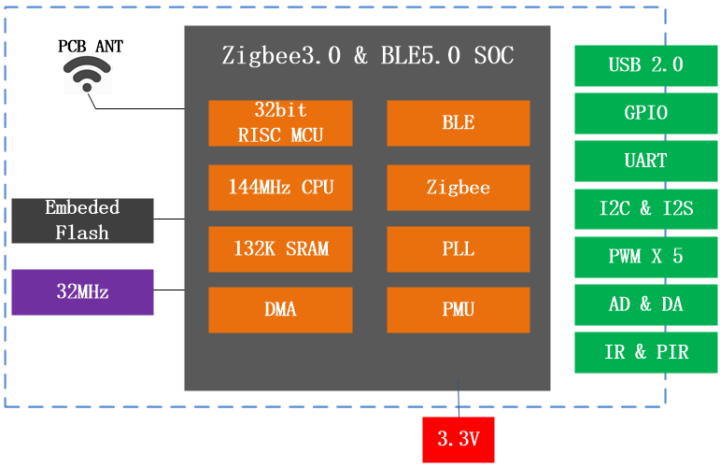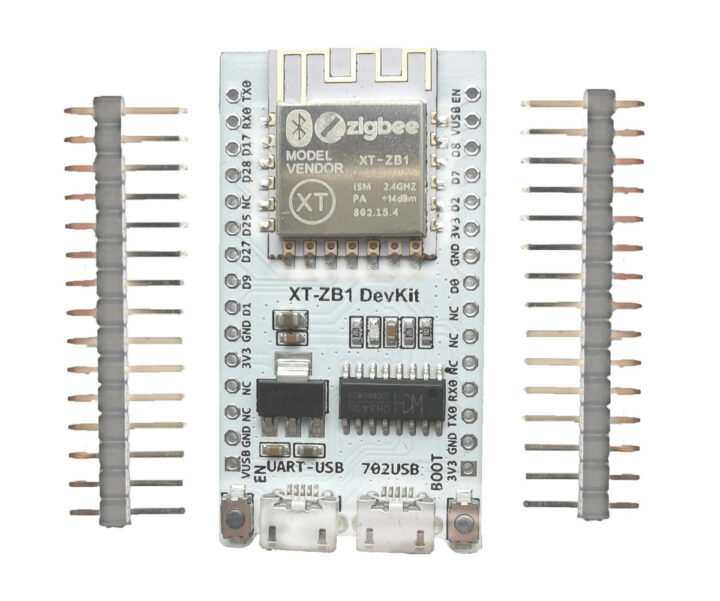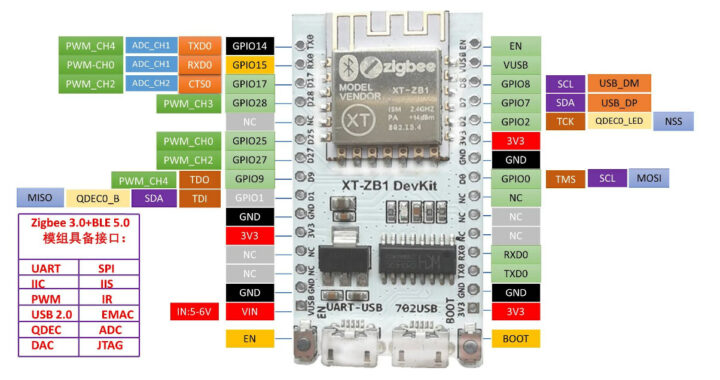Bouffalo Labs BL702 is a 32-bit RISC-V microcontroller with a 2.4 GHz radio for Zigbee 3.0 and Bluetooth 5.0 LE connectivity that we first found in the Sipeed RV-Debugger Plus UART & JTAG debug board that did not make use of the radio at all.
But a BL702 development kit was brought to my attention, with the XT-ZB1 devkit equipped with a Zigbee & BLE module of the same name, and sold for just $1.80 per unit on Aliexpress. Shipping adds $4.63 where I live, but they also offer packs of 5 or 10 with the same shipping fee, meaning if you buy 10 the total cost should be around $22 including shipping, or around $2.2 per board. Alternatively, the module alone goes for $1.
- XT-ZB1 wireless module with
- MCU – BL702C 32-bit RISC-V microcontroller @ 144 MHz with FPU, 132KB RAM, 192KB ROM, 1Kbit eFuse
- Storage – 8MB embedded flash
- Connectivity
- 2.4 GHz radio
- 802.15.4, Zigbee 3.0, Bluetooth 5.0 LE with long range support, up to 2 Mbps bitrate
- PCB antenna
- Power Consumption @ 3.3V
- Rx only – 3.5 mA
- Tx – 0dBm: 4.9 mA, 10 dBm: 17mA; 14 dBm: 45 mA
- Hibernate – 1.2 uA
- Shutdown – 0.1 uA
- Dimensions – 20 x 16 x 3mm
- USB – 1x Micro USB port to BL702, 1x Micro USB port for serial console (via CH340 USB to TTL chip)
- Expansion – 2x 15-pin headers with GPIO, PWN, ADC, UART, I2C, SPI, USB, JTAG, VIN, 3.3V, GND (The headers are soldered based on the descripion)
- Misc – Enable and Boot buttons
- Power Supply – 5V via micro USB port, 5 to 6V via VIN pin

English documentation for the module and devkit can be found on bl602.fun website, where we’ll also find a smaller XT-ZB2 BL702 module. Both modules are designed for “serial transparent transmission”, Smart power plugs, Smart LED lights, sensor networks, and industrial wireless control.
Software resources include a link to the bl_mcu_sdk Github repo, an MCU software development kit provided by Bouffalo Lab Team for BL602/BL604, BL702/BL704/BL706, and future RISC-V based chips. There’s also documentation for the SDK, but that part is only in Chinese. The SDK includes samples for BLE and peripherals, but I can’t seem to find any Zigbee or 802.15.4 demos…That’s because that part of the SDK requires an NDA:
BL702 15.4/zigbee SDK is only avaliable (sic.) when NDA is signed
I found about the board through a tweet by Lup Yuen Lee, and Jonathan Beri also commented that the ZigBee stack is usually licensed. So while this BL702 devkit supports Zigbee, an extra license may be required to (legally) use the 802.15.4/Zigbee.

Jean-Luc started CNX Software in 2010 as a part-time endeavor, before quitting his job as a software engineering manager, and starting to write daily news, and reviews full time later in 2011.
Support CNX Software! Donate via cryptocurrencies, become a Patron on Patreon, or purchase goods on Amazon or Aliexpress. We also use affiliate links in articles to earn commissions if you make a purchase after clicking on those links.







If not for the NDA, this would be the first cheap SOC zigbee. On the other hand, I don’t understand why they require NDA for 802.15.4 MAC – this is an open standard (all other vendors provide API with at least MAC layer).
Usually you ask for NDAs when you’re really not proud of your work. And I can say that each time I had to sign one, this principle was pushed to its extreme. Nowadays I use that request as an indicator of crap and I pass my way, not even wanting to waste time on unfinished stuff that even the vendor knows they have to be ashamed of.
“Usually you ask for NDAs when you’re really not proud of your work.”
Ha ha ha haha incorrect.
I agree looks like a nice board for the money, but if zigbee isn’t working out of the box its not very useful.
Also what is the state of the bouffalolab’s sdk? is it clean and usable or a thrown together freertos like we used to see with rtl8710.
What’s the status of the pine64 boufalo liberation thingie? Any progress?
See here https://github.com/pine64/bl602-docs/tree/main/hardware_notes#rf-ip
Official SDK @github: if you read issue 1 you can see that they are commited to deliver an as open platform as possible.
TLSR8269 modules? $1 at eBay.
why are they still making boards with micro USB in 2021?
Usually the reason is that it’s still cheaper and more common than USB-C for data transfers (USB-C is better for power delivery). On this board a more important reason is obvious: the size. Putting two USB-C connectors would make the board significantly larger for no benefit. Size matters.
Thanks for the mention!
NDAs & licensed stacks are very common in the chip industry and it’s not always the chip makers “fault.” The IP such as a wireless PHY is usually licensed from an IP company like Cadence. The IP owner often defines terms of the license. So:
Of course there are different IP vendors and some chip makers create their own IP, which is why we see more open datasheets and SDKs.
The reason why Zigbee stacks are all licensed is due to the restrictions from the Zigbee/CSA group. IPR restrictions for non-members are very common in the networking protocol.
FWIW, the most popular Zigbee stack is ZBoss, which it doesn’t seem to be what they’re using.
Will be interesting to see where espressif esp32-h2 is priced. Espressif already released precompiled libs for zigbee stack.
Actually I would be interested in using the BLE and 802.15.4 radios as kind of a replacement for a nrf24L01, not using a ble stack etc. But I doubt any data is permitting this as if now, neither for ESPs…
NDA only for Zigbee. Actually 802.15.4 API & demo had been open weeks ago. Please refer to github.com/bouffalolab/bl_iot_sdk. Thanks